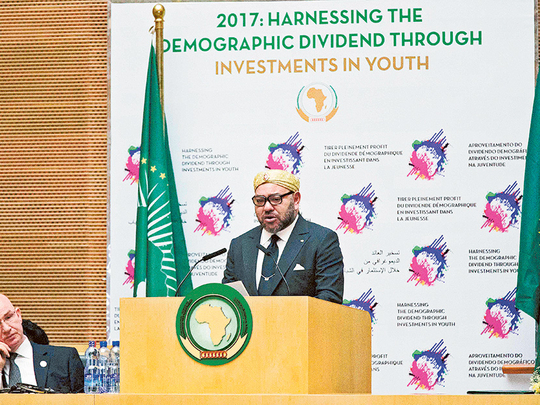
Manama: Morocco’s King Mohammad VI took a seat at the African Union headquarters Tuesday for the first time in 33 years after being re-admitted by the bloc.
“It is a beautiful day when one returns home after too long an absence. Africa is my continent and my home. I am finally home and I am happy to see you. I missed you all,” the monarch told the closing ceremony of the AU summit in Ethiopia.
Morocco’s return to the fold comes a day after 39 of the AU’s 54 member states agreed to allow Morocco back in the fold, despite stiff resistance from countries such as South Africa and Algeria over the status of Western Sahara.
Morocco quit the then Organisation of African Unity (OAU) in 1984 after the bloc admitted the former Western Sahara as a separate member.
Morocco maintains that the former Spanish colony under its control is an integral part of the kingdom, while the Polisario Front, which campaigns for the territory’s independence, demands a referendum on self-determination.
Some had feared Morocco would demand the expulsion of the SADR as a precondition for its own return to the AU, however the country agreed to return without conditions.
“From the moment that Morocco did not impose conditions ... we take their word for it and accept that Morocco be admitted to the African Union,” said Mohammad Salem Ould Salek, foreign minister of the Sahrawi Arab Democratic Republic (SADR), which claims sovereignty over the entire territory of Western Sahara.
The bloc’s decision crowns a carefully planned strategic diplomacy throughout the continent launched by King Mohammad and consolidates the new status of the North African country as a strong player across Africa.
Morocco’s readmission, four months after it deposited its membership application, was the most anticipated event at the summit of heads of state of the union.
Rabat considers the Western Sahara as its southern provinces and sees SADR as a breakaway entity that claims to represent the Saharawis and wishes to establish an independent state in the Western Sahara in southern Morocco.
The dispute came in the open in 1975 after Spain agreed to leave the Western Sahara, and to transfer it to joint Moroccan-Mauritanian control. Algeria objected and threatened military intervention.
In 1976, Algeria announced the formation of SADR with a government-in-exile, while the Polisario Front began a guerrilla war against the Moroccan military.
With the admission of SADR in the OAU, Morocco pulled out of the organisation that it helped found. The Polisario took advantage of the absence of Morocco to promote its credentials, backed by African heavyweights at the time Algeria, South Africa and Nigeria.
More than three decades later, King Mohammad VI decided to reverse course and readmit his country in the African family.
In July last year, he expressed in a letter to the African Union summit in Kigali, Rwanda, Morocco’s intention to return to the organisation.
“When it withdrew from the OAU, Morocco never left Africa. In 1984, it simply left an institution in very special circumstances,” King Mohammad said in his letter. “My country’s passionate relationship with the Continent explains why the recognition of a pseudo state was understandably too hard for the Moroccan people to accept. Indeed, it is difficult to admit that the Kingdom — a nation steeped in history — could somehow be compared to an entity that meets none of the attributes of sovereignty and that is deprived of any representativeness or effectiveness.”
Moroccans felt that the admission of a non-sovereign entity, by means of transgression and collusion, was something they simply could not accept, he said.
King Mohammad VI said that today among the group of 26 countries that chose the ‘division camp’ in 1984, only ten countries recognise SADR and at least 34 AU countries have never recognised or no longer recognise that “so-called state that is not a member of the United Nations, the Organisation of Islamic Cooperation, the Arab League or any other sub-regional, regional or international institution.”
The monarch said that time to “return to the AU” had come and that Morocco should “take its natural place within its institutional family.” That time has now come.
“On reflection, it has become clear to us that when a body is sick, it is treated more effectively from the inside than from the outside … Morocco should not remain outside its African institutional family and should regain its natural, rightful place within the AU. From within, Morocco will contribute to making the AU a more robust organisation — one that is both proud of its credibility and relieved of the trappings of an obsolete era.”
For some analysts, Morocco sought to benefit from the death of the long-standing leader of Western Sahara’s Polisario movement, Mohammad Abdul Aziz, in May 2016 and the arrival of a new chief who could be less intransigent over the Moroccan solution to the dispute.
Rabat also sought to ease the pressure on its troops at the borders and direct them to help tackle the increasingly menacing threats of terrorism, observers said.
At the same time, support among Arab and African countries for SADR was noticeably declining amid concerns about threats by separatist movements to national unity and territorial integrity.
The “Look Africa” drive by the Moroccan monarch with its enormous economic and political benefits was also crucial in the decision to rejoin the African Union.
For King Mohammad VI, it was high time to return to the African Union, the increasingly significant arena to consolidate its status and power.
— with inputs from agencies












